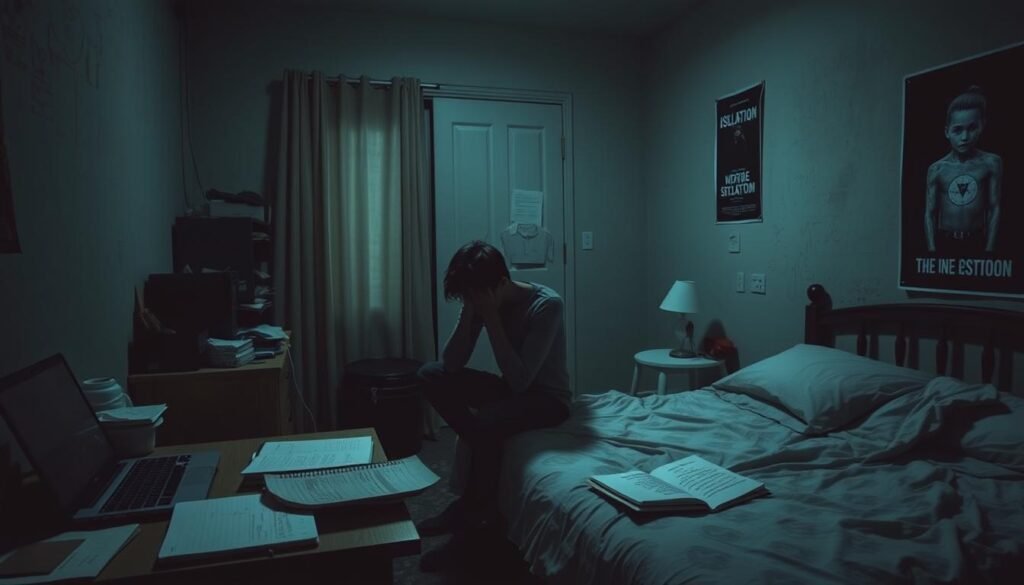Did you know about 32% of teens in the U.S. face anxiety disorders? This fact highlights the need to confront mental health issues in youth. With anxiety on the rise among teenagers, parents must learn to deal with their child’s emotional struggles. The COVID-19 pandemic has made this even more crucial.
Parents have a key role in their child’s mental wellness. They can help by being supportive and encouraging open talks. This support can help teens learn how to deal with their anxiety. Equipping young people with the right tools is essential for their growth into resilient individuals.
Key Takeaways
- About 32% of adolescents in the U.S. experience anxiety disorders.
- Parental support is crucial for adolescent mental health.
- Effective communication can help teens develop coping mechanisms.
- Many teens face heightened feelings of sadness and hopelessness.
- Anxiety disorders can severely impact a teen’s functionality.
- Social media use can contribute to mental health challenges among teens.
Understanding Teen Anxiety: An Overview
Teen anxiety disorders are a big issue, especially today. Many teens get anxious due to many stress factors. These can be extra pressure from friends or school work. Research from Johns Hopkins Medicine shows nearly 1 in 3 teens face anxiety disorders. It’s key to know the difference between normal worry and serious anxiety.
Statistics on Adolescent Anxiety Disorders
Anxiety and depression rank high as teen mental health issues. If a teen suddenly seems very irritable or stops liking usual activities, parents should note. Being isolated or worried about fitting in can lead to strong anxiety symptoms. Finding these signs early matters, as ignoring them could worsen a teen’s life at school and with friends.
How COVID-19 Impacted Teen Mental Health
The pandemic made teen pressures worse, raising anxiety. Changes in social and school life brought more stress and loneliness. Parents’ own stress affects their children, with anxiety being shared within the family. Having an adult to talk to can really help a teen. Parents can help by chatting about mental health and showing ways to handle anxiety. This can make a big difference during tough times like the pandemic.
Signs and Symptoms of Anxiety in Teens
It’s key to spot anxiety signs in teens early. These signs come in many forms and can disrupt a teenager’s daily life. While some signs are hard to notice, others are clear and harm their mental health. Knowing these symptoms helps parents support their children better.
Common Symptoms and Their Implications
Common symptoms of anxiety in teens include:
- Excessive worry about everyday activities
- Difficulty concentrating
- Physical complaints such as headaches or stomach aches
- Withdrawal from social activities
- Drop in school performance
These issues can lower a teen’s life quality. For example, being irritable and pulling away from friends and family can hurt relationships. Struggling to focus can affect grades, making anxiety worse. Spotting these signs early is crucial. It lets parents get the right help.
Parents can learn how to notice these signs by visiting this helpful link.
Differences Between Childhood and Adolescent Anxiety
Anxiety looks different in teens than in young kids. Younger kids may get irritable or throw tantrums. But as they grow, their anxieties change, reflecting new challenges. Teens often stress about how others see them, schoolwork, and friendships. Understanding these differences helps parents support their children’s needs through every stage.

The Role of Parents in Managing Teen Anxiety
Parents have a key role in shaping their teenager’s mental health, particularly with anxiety. They create a nurturing environment with parental support strategies. This environment helps teens deal with their mental health better. Studies show a link between the emotional well-being of parents and their kids. By using proactive steps, parents can give teens vital anxiety coping mechanisms.
How Parental Support Influences Teen Mental Health
Open communication makes teens more open to sharing their worries. Showing healthy ways to cope and providing emotional support builds resilience. This support helps teens face school stress, social media, and family issues, which are big anxiety triggers.
About 9% of kids aged 3-17 have anxiety, showing how crucial parental support is. Encouraging talks on mental health and sharing personal struggles can make family bonds stronger and promote healing together.
| Parental Support Strategies | Potential Benefits |
|---|---|
| Active Listening | Promotes emotional regulation |
| Modeling Coping Skills | Equips teens with problem-solving tools |
| Encouraging Mindfulness | Reduces anxiety symptoms |
| Facilitating Healthy Routines | Enhances sleep and overall well-being |
Active engagement by parents in their teen’s lives helps with healthier coping and better family relationships. It shows the value of a supportive home where mental health is a priority.
Parental Support Strategies for Anxious Teens
Parenting strategies have a big impact on teenage mental health, especially with anxiety. A key approach is to listen actively without judging. This lets teens share their fears and anxieties openly. They feel safe and supported this way.
When parents validate their child’s feelings without offering quick advice, it builds trust. It helps teens feel really listened to and understood.
Listening Without Judgment
Listening without judging is vital for supporting anxious teens. It allows them to talk about their complex feelings. Parents can then truly understand what their teens are going through. This builds a stronger connection between them.
By not reacting right away, parents give their kids space to explore their feelings. This leads to healthier ways of expressing emotions.
Encouraging Open Communication
It’s crucial to encourage open communication to manage anxiety in teens. Parents can do this by having regular family activities or setting special times for chats. These moments create a feeling of belonging and safety, making it easier for teens to open up.
Using good communication skills, like asking open-ended questions, fosters deeper talks. This improves emotional understanding and support.

Communication Skills for Parents
Effective communication is key for parents helping anxious teens. It leads to better mental health for teenagers. Parents who are good communicators create a space where kids can share freely. This connection is vital. It makes families stronger and supports the teen’s emotional health.
Effective Listening Techniques
For parents, knowing how to listen is crucial. Active listening means:
- Providing undivided attention: Give your full attention to show you care and understand.
- Using affirming body language: Nods and eye contact make teens feel heard and encourage them to open up.
- Responding thoughtfully: Thoughtful feedback validates feelings and opens up communication.
Being patient is important. It lets the teen talk about their feelings without being cut off. This supportive attitude shows how much their thoughts and emotions matter. It also helps parents become better at communicating.
Asking Open-Ended Questions
Open-ended questions help start deep conversations. They avoid simple “yes” or “no” answers. Instead of asking about their day directly, you might ask, “What was the best part of your day?” This question encourages them to think and share more.

- “How did that situation make you feel?”
- “What challenges did you face this week?”
- “Can you tell me more about what you enjoy doing?”
With open-ended questions, parents can really understand their teens. This way, they can support their kids better when dealing with anxiety.
Mindfulness for Teens: A Parental Guide
Mindfulness is key for teens dealing with anxiety. With anxiety affecting 32% of adolescents, parents are crucial. They can introduce mindfulness practices to help their teens cope and find emotional stability. This includes developing anxiety coping mechanisms.
Teens often struggle with school stress and social media. Mindfulness, like deep breathing and meditation, offers peace. Parents doing these activities with their teens turns it into a family practice.
About 83% of mindful teens report better emotional control. This shows how mindfulness boosts mental health. Parents can help by creating a mindful environment. This encourages teens to be present and think without judgment.
Starting a mindfulness routine can be simple. It might include guided meditations or quiet reflection during family time. These practices help with anxiety and bring families closer through shared experiences.
A supportive home is crucial for teens facing anxiety. Parents should acknowledge every progress, showing understanding. Through mindfulness, teens better handle their emotions. This leads to better mental health.
Cognitive-Behavioral Interventions for Anxiety
Cognitive-behavioral interventions (CBIs) help parents aid their teens with anxiety. These methods change negative thoughts and actions that hurt emotional health. By learning how CBIs work, parents and mental health professionals can work together. This helps create a caring space for positive thinking and strength. It’s crucial to note that anxiety often appears in young people. This makes it necessary to use various tools to handle anxiety.
What Parents Need to Know
Parents have a big part in using cognitive-behavioral interventions successfully. Around two-thirds of kids getting Cognitive Behavioral Therapy (CBT) for anxiety get better after treatment. Studies show that more young people now face anxiety disorders. This has made it important for parents to know how to support their children. By using these methods at home, families can keep up the progress made in therapy.
Home-Based Techniques to Try
Parents can try different things at home to support their teen’s therapy. These steps aim to help build ways to deal with anxiety. They also make a safe place for sharing feelings.
- Journaling: Encourage teens to write about their thoughts and feelings. This can help spot what triggers their anxiety and how they react.
- Role-Playing: Practice situations that cause anxiety to improve coping skills for real life.
- Goal Setting: Help them set small, realistic goals. This gently exposes them to what they fear, helping them deal with anxiety.
Using these methods helps teens face their fears and find ways to cope with anxiety. It also makes the parent-child relationship stronger through supportive talks.
| Technique | Description | Benefits |
|---|---|---|
| Journaling | Writing down feelings and thoughts regularly. | Enhances self-awareness and identifies triggers. |
| Role-Playing | Practicing responses to anxiety-inducing situations. | Improves confidence and coping strategies. |
| Goal Setting | Establishing small, achievable goals over time. | Fosters a sense of accomplishment and progress. |
Bringing these techniques into the home adds to the support parents can give. It helps make cognitive-behavioral interventions more effective. This leads to a better environment for teens with anxiety.
Family Therapy Techniques and Support
When families work together in treatment, it helps teens deal with anxiety better. Family therapy is key for teens facing mental health challenges. It improves how family members talk and understand each other. This makes a home more supportive, helping with anxiety.
Benefits of Involving the Family in Treatment
Family involvement in therapy offers many benefits for mental health.
- Improved Communication: Therapy helps families talk better, sharing feelings and worries openly.
- Fostering Resilience: Families learn to solve problems together. This creates a supportive environment for dealing with anxiety.
- Decreased Isolation: Bringing parents and siblings into the picture makes teens feel less alone with their anxiety.
- Behavioral Changes: Therapy guides parents on how to help. This leads to a happier family life.
Finding the Right Resources
Parents need the right information to help their anxious teens.
- Look for mental health experts who focus on young people.
- Find support groups for families tackling anxiety.
- Check out online materials aimed at helping youth mental health.
Family therapy and support from parents are powerful tools against anxiety. By knowing how family plays a part, parents can offer the caring space teens need for mental health.
Conclusion
Parents play a key role in helping teens deal with anxiety. It’s vital for their emotional growth. In the U.S., about 32% of teens experience anxiety disorders. This shows how crucial parental support is in facing these challenges.
By talking more and listening, parents can help kids face their fears. Making a home feel safe is key for teens to handle their feelings better. The way parents act and connect affects their teen’s emotions a lot. A caring approach helps teens manage their emotions and strengthens family ties.
Parents involved in their teen’s mental health make a big difference. They help reduce anxiety rates among teens. Knowing more about teen mental health helps parents support their kids better. This fosters resilience and well-being.